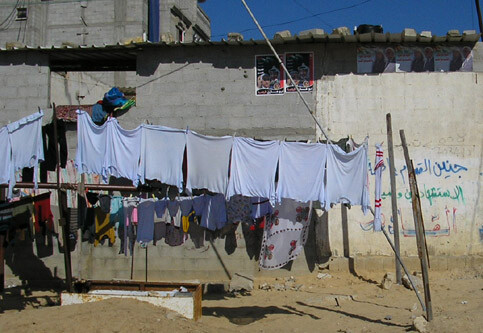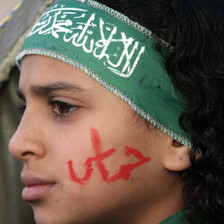Al Jazeera 1 February 2005

With a Hamas’ victory in Gaza’s local elections, and its earlier good performance in the West Bank mayoral elections on 23 December, it is likely the movement will be encouraged to participate fully in July’s legislative elections. (Arjan El Fassed)
Despite Israel’s efforts to destroy Hamas, including assassination of most of its top leaders, the resistance movement was able to emerge victorious in local elections held in 10 Gaza towns and villages last week.
Hamas’ Reform and Change lists won 77 seats out of the 118 contested seats, while Fatah, the ruling party of the Palestinian Authority, won only 26. The remaining seats went to clan and independent candidates, some allied to Fatah. The Popular Front for the Liberation of Palestine (PFLP) won a lone seat.
The results were an unpleasant surprise for Fatah and the Fatah-dominated PA for several reasons. Firstly, the population centres in which the elections were organised had long been considered traditional power bases for Fatah. It was this belief that prompted Palestinian elections officials to select these areas as test case for the elections, assuming that a Fatah victory in these localities (eg Bait Hanun in northern Gaza) was nearly a foregone conclusion. It was hoped a Fatah victory here would signal more Fatah election victories elsewhere.
Secondly, the towns and villages where the Hamas won most of the votes have been among the hardest hit by sustained Israeli bombardment and bulldozing.
Psychological warfare
According to the municipal council of Bait Hanun, about 40% of Bait Hanun farms and citrus groves have been bulldozed by the Israeli army. The same could be said about the bulk of civilian infrastructure in the town, including roads, bridges, electricity and water networks.
Israel repeatedly claimed that the demolition of thousands of Palestinian homes in the Gaza Strip was a retaliation for Palestinian resistance, spearheaded by Hamas. In short, the Israeli goal was to turn the populace against Hamas, by telling them: “Hamas brought this on you.”
Hamas loyalty
But the voting victory seems to indicate Israeli aims failed. “We do not view Hamas through Israeli glasses; Hamas is us, and we are Hamas,” said one middle-aged farmer who voted for the resistance movement.
“Hamas is against corruption, and we do not like corruption; Hamas is against Israel, and we hate Israel. Israel’s hatred of Hamas is a clarion vindication for Hamas, it is a certificate of good conduct for this great movement.”
One of the questions remaining about the latest results in Gaza is why the people who voted for PA leader Mahmud Abbas on 9 January are often the same people who voted for Hamas in several Gaza localities. Some analysts have interpreted this as proof that Hamas may have surreptitiously told some of its supporters to vote for Abbas.
Corruption fatigue
However, Ashraf Ajrami, a Fatah-affiliated journalist, believes a more plausible explanation could be that Gazans, fed up with years of corruption and nepotism by Fatah operatives and officials, chose to punish the movement by voting for local Islamist leaders, long tested through charitable and social activities in their communities.
Writing in the Al-Ayyam newspaper on Monday, Ajrami argued that Hamas’ victory was more a punishment of Fatah and less an infatuation with Hamas’ ways, especially the firing of home-made Qassam missiles on Israeli settlements, which invited Israeli revenge attacks.
Abbas Zaki, a leading member of Fatah’s central committee, blamed Fatah’s setback in Gaza on inadequate preparations and poor campaigning. “Fatah simply was preoccupied with the presidential elections. We didn’t prepare adequately for the Gaza elections. I hope we will learn the lesson in the upcoming elections,” he said during a radio interview last week.
However, according to Ghazi Hamd, editor-in-chief of the Gaza-based Islamist weekly, Al-Risala, the most important factor behind the overwhelming support for Hamas in Gaza is what he calls “the religiosity factor”.
“Most Gazans are religious and people simply think that it is morally incumbent on them to give their votes to religious candidates who uphold Islamic values such as honesty, justice, and self-abnegation.”
With a Hamas’ victory in Gaza’s local elections, and its earlier good performance in the West Bank mayoral elections on 23 December, it is likely the movement will be encouraged to participate fully in July’s legislative elections.
Moral stance
Hasan Yusuf, a West Bank Hamas spokesman says: “It is no secret that Hamas is under pressure from wide sectors of Palestinian society to participate in the upcoming legislative elections.” He told Aljazeera.net the movement was studying its options, including entering into a coalition with other Islamist and national forces.
“Hamas is not, and will never be, a selfish movement; we are mere servants of the Palestinian people and we will cooperate with all forces to expedite the interests of our people.”
Moreover, the enhanced position of Hamas will further consolidate the movement’s status and stature in Palestinian society as a fundamental political player on an equal footing with Fatah. It remains unclear if the strengthening of Hamas through the ballot boxes will push the movement towards more moderation, as some observers have suggested, or prompt Hamas leaders, especially those based abroad, to reassert their erstwhile radicalism that invited international sanctions and hostility.
Yusuf alluded to this aspect, saying Hamas was not living on another planet. “We are a misunderstood movement. We will always choose moderation over extremism, extremism is incompatible with our faith and is counterproductive.”
Moderate approach
Hamas is already showing signs of moderation not only vis-a-vis the reformist Palestinian leader Abbas, but also in relation to the peace process. The movement has agreed to a ceasefire with Israel, on condition of reciprocity and the release of Palestinian detainees in Israeli jails.
The movement has also indicated that it will accept a political settlement involving a total Israeli withdrawal from the West Bank, Gaza Strip and East Jerusalem as well as the repatriation of Palestinian refugees expelled by Israel in 1948.
Such a position, says Palestinian commentator Hani al-Masri, will consolidate Palestinian national unity as never before and allow the formation of a broad-based national consensus on the paramount final-status issues. This, the PA leadership hopes, will ultimately convince the international community, especially the United States, that the obstacle to peace in Palestine-Israel, is not the Palestinians, not even Hamas or so-called terrorism, but rather the Israeli occupation of the Palestinian homeland and refusal to come to terms with Palestinian rights to freedom and self-determination.
Khalid Amayreh is a journalist based in the occupied West Bank. This article was originally published by aljazeera.net and reprinted on EI with permission.
Related Links





